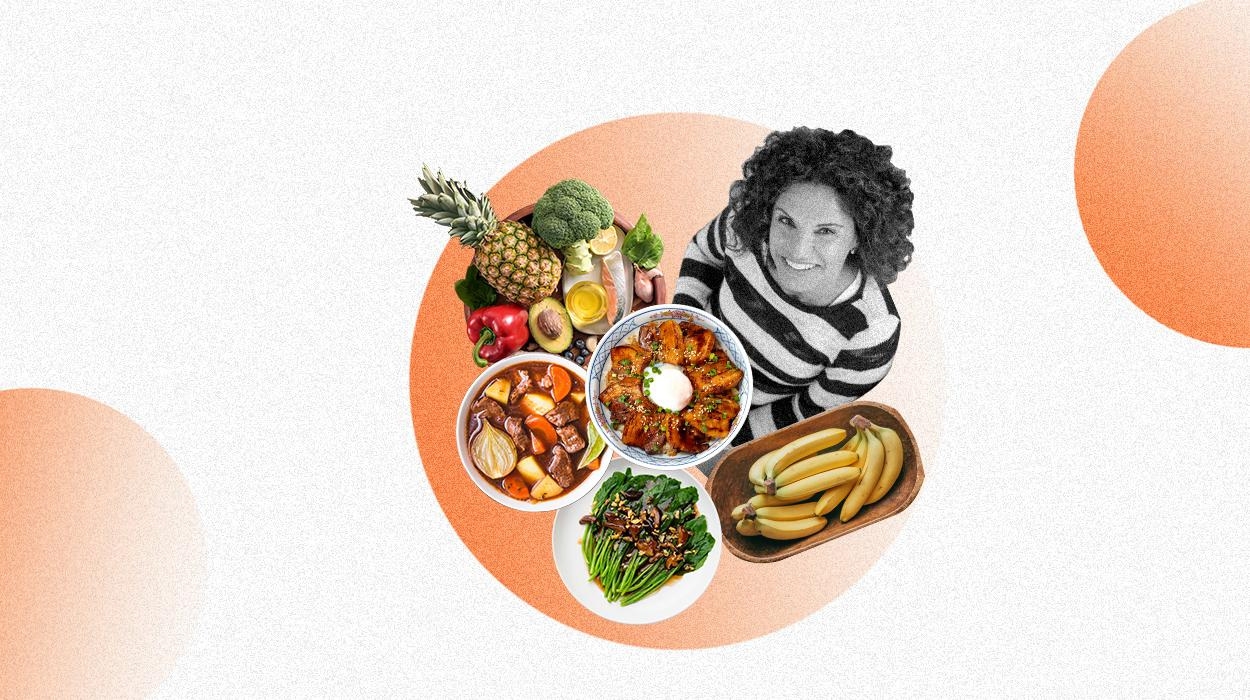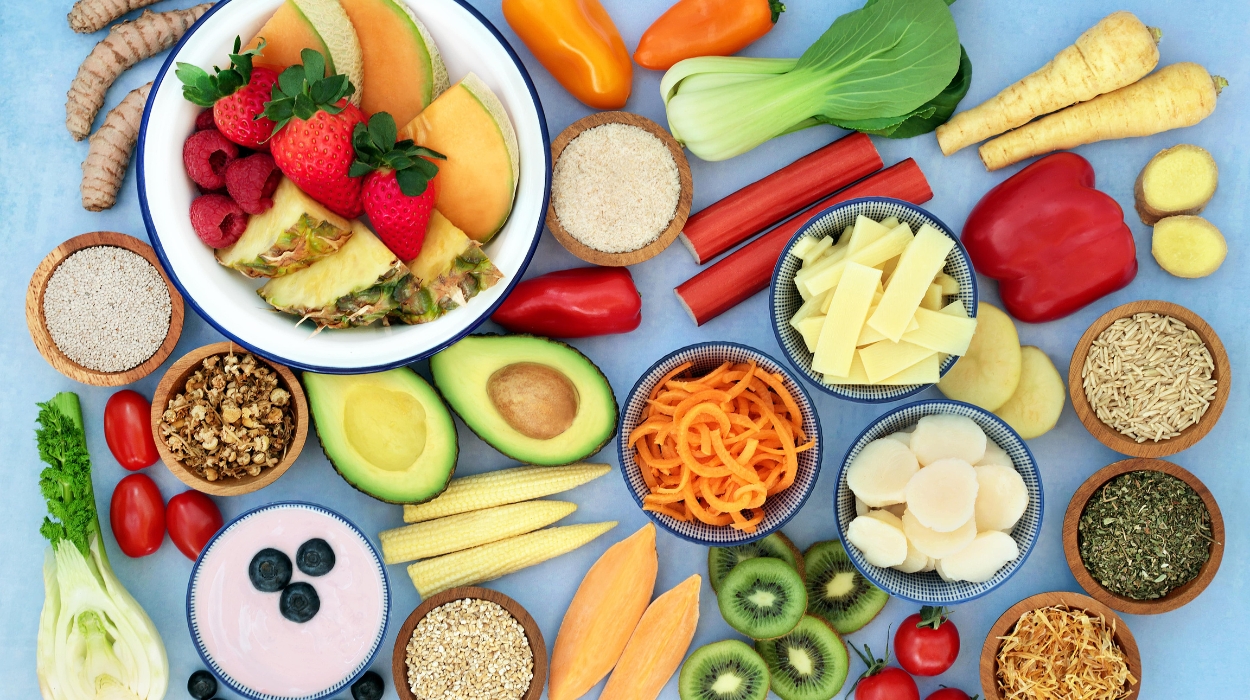 Expert's opinion
Expert's opinion
Expert's opinion
The article is a subjective view on this topic written by writers specializing in medical writing.
It may reflect on a personal journey surrounding struggles with an illness or medical condition, involve product comparisons, diet considerations, or other health-related opinions.
Although the view is entirely that of the writer, it is based on academic experiences and scientific research they have conducted; it is fact-checked by a team of degreed medical experts, and validated by sources attached to the article.
The numbers in parenthesis (1,2,3) will take you to clickable links to related scientific papers.
Anti-Inflammatory Diet For IBS: What Is It & Foods List In 2024

Living with irritable bowel syndrome, also called IBS, can be challenging. The condition often causes discomfort and digestive issues. Some people successfully manage their symptoms by eating an anti-inflammatory diet for IBS. By eating foods that promote gut health and avoiding those that trigger symptoms, they’re able to stay on top of their condition.
The exact cause of IBS remains unknown. Several different problems likely contribute to the condition. These include issues with how the brain and gut interact and food sensitivities. People are more likely to develop IBS if they consume an inflammatory diet. Likewise, eating anti-inflammatory foods can help to manage symptoms.[1] Discover more about foods for IBS below.
Meal Plan For Anti-Inflammatory Diet For IBS
Below, we’ll walk you through an anti-inflammatory diet plan for IBS. If you’re pressed for time, consider seeking out meal delivery services to help you stick to a healthy, balanced diet.
Day 1: IBS-Friendly Anti-Inflammatory Feast (approx. 1,206 calories)
This meal plan is designed to support individuals with Irritable Bowel Syndrome (IBS) who are following an anti-inflammatory diet. It includes a variety of nutrient-dense foods to help manage inflammation and promote digestive health.
| Breakfast | |
| Old-fashioned oats | 1/2 cup |
| Unsweetened almond milk | 1 cup |
| Sliced strawberries | 1/2 cup |
| Lunch | |
| Whole-grain bread | 2 slices |
| Roasted turkey breast | 3 oz |
| Fresh spinach leaves | 1 cup |
| Olive oil-based dressing | 1 tbsp |
| Snack | |
| Macadamia nuts | 1/4 cup |
| Dried cranberries | 1/4 cup |
| Dinner | |
| Medium sweet potato | 1 |
| Skinless, boneless chicken breast | 4 oz |
| Medium fresh tomato | 1 |
| Seasonings and olive oil for roasting |
Day 2: IBS-Friendly Anti-Inflammatory Delights (approx. 930 calories)
This meal plan includes meals and snacks that are gentle on the digestive system and aim to reduce inflammation. Each item is carefully measured, and the plan provides the necessary nutritional information, including calories, carbohydrates, protein, and fat content, to help you maintain a balanced and nourishing diet throughout the day.
| Breakfast | |
| Cucumber | 1 |
| Leafy green vegetables | 2 cups |
| Hulled hemp seeds | 30g |
| Fruit | 1 |
| Water | 2 tbsps |
| Lunch | |
| Canned tuna in water, drained | 3 oz |
| Mixed salad greens | 1 cup |
| Sliced cucumber | 1/2 |
| Halved cherry tomatoes | 1/4 cup |
| Olive oil and vinegar dressing | 1 tbsp |
| Snack | |
| Puffed rice cereal | 1/2 cup |
| Unsweetened shredded coconut | 2 tbspS |
| Dark chocolate chips | 1 tbsp |
| Maple syrup | 1 tbsp |
| Dinner | |
| Cooked brown rice pasta | 1 cup |
| Tomato pasta sauce | 1/2 cup |
| Tofu | 1/2 block |
| Avocado oil | 2 tbsps |
Day 3: IBS-Friendly Anti-Inflammatory Harmony (approx. 1,500 calories)
The meals are designed to reduce inflammation and promote digestive health while offering a variety of flavors and nutrients. Remember to drink plenty of water throughout the day, and adjust portion sizes according to your specific dietary needs and preferences.
| Breakfast | |
| Large eggs | 2 |
| Crumbled feta cheese | 1/4 cup |
| Sliced olives | 1 tbsp |
| Lunch | |
| Lean ground beef, seasoned with oregano and paprika | 4 oz |
| Gluten-free taco shells | 2 |
| Shredded lettuce | 1 cup |
| Chopped tomatoes | 1/2 cup |
| Avocado | 1/2 |
| Snack | |
| Pine nuts | 1/4 cup |
| Dairy-free yogurt | 1 cup |
| Sweeten with stevia as desired |
| Dinner | |
| Cooked brown rice | 1 cup |
| Large eggs | 2 |
| Grated carrots | 1/2 cup |
| Low-sodium soy sauce | 2 tbsps |
| Finely sliced spring onions | 2 tbsps |
Day 4: IBS-Friendly Anti-Inflammatory Bliss (approx. 1,600 calories)
This meal plan focuses on foods that are gentle on the digestive system, reduce inflammation, and support overall digestive health. It provides a balanced mix of nutrients and flavors while minimizing potential triggers for digestive discomfort.
| Breakfast | |
| Gluten-free bagel | 1 |
| Peanut butter | 2 tbsps |
| Unsweetened strawberry jam | 1 tbsp |
| Coffee | 1 cup |
| Lunch | |
| Baked salmon | 4 oz |
| Cooked brown rice | 1 cup |
| Sliced carrots | 1/2 cup |
| Sliced bell pepper | 1/2 cup |
| Sliced cucumber | 1/2 cup |
| Shredded cabbage | 1/2 cup |
| Snack | |
| Medium zucchini, sliced and baked | 1 |
| Season with oregano and rosemary |
| Dinner | |
| Grilled chicken breast | 4 oz |
| Cooked brown rice | 1 cup |
| Mixed vegetables | 1/2 cup |
| Season with turmeric and other preferred spices |
What Is An Anti-Inflammatory Diet For IBS?
IBS patients are often recommended to follow a low FODMAP diet to improve their digestive symptoms. This way of eating benefits the digestive system tract by avoiding high-FODMAP foods that contain hard-to-digest carbohydrates.
Research shows that this diet improves IBS symptoms[2] – especially abdominal pain and bloating. However, it is a restrictive diet and can increase the risk of nutritional deficiencies. Also, its ability to reduce gut inflammation[3] isn’t clear.
Although IBS isn’t an inflammatory condition, inflammation might play a role.[4] Adding anti-inflammatory foods to a low FODMAP diet plan can help reduce chronic inflammation[5] and aid digestion. Discover the foods to include and avoid below.
Different Types Of IBS
IBS is a chronic gut condition that can cause debilitating symptoms. The symptoms of irritable bowel syndrome include digestive symptoms, intestinal discomfort, and pain elsewhere in the body. The main signs of IBS include:
- Cramping.
- Bloating.
- Diarrhea.
- Constipation.
- Headache.
Some symptoms are more common depending on the type of IBS you have. There are three main forms of the condition:
- IBS-D: This stands for diarrhea-predominant IBS and features diarrhea as a major symptom.[6] The exact causes of IBS-D are unknown. One possible cause is rapid intestinal contractions, causing stool to move through the body too quickly for sufficient water absorption.
- IBS-C: This stands for constipation-predominant IBS and might be caused by the slow movement of stool through the intestines. IBS-C symptoms include constipation, bloating, and stomach discomfort.
- IBS-mixed: As the name suggests, this form of IBS involves varying symptoms[7] of diarrhea and constipation.
Anti-Inflammatory Food List For IBS

There are many delicious foods that have a place in an anti-inflammatory, low-FODMAP IBS diet.
Aim for a predominantly whole food plant-based diet. Whole plant-based foods contain antioxidants and other plant compounds[8] that have anti-inflammatory properties.
Probiotic foods contain beneficial bacteria. They can improve gut health by helping balance gut bacteria. Studies suggest probiotic yogurt may also reduce homocysteine levels[9] – an inflammatory marker – in those with IBS. So try including high-protein yogurt as a probiotic for IBS.
This is not an exhaustive list, but some foods to include are:
- Fruits such as coconut, kiwi, and papaya.
- Vegetables include broccoli, cabbage, and potato.
- Seafood, including tuna, salmon, and shrimp.
- Wheat-free bread.
- Protein-rich foods such as eggs and tofu.
- Whole grains such as brown rice and oat.
- Nuts and seeds such as almonds and chia seeds.
- Condiments such as peanut butter and tahini.
Foods To Avoid For IBS Anti-Inflammatory Diet
A pro-inflammatory diet might exacerbate symptoms such as bloating. Try to avoid pro-inflammatory foods[10] such as meat, processed foods, and refined grains. This might be in addition to avoiding high-FODMAP foods such as:
- Fruits, including apples and pears.
- Vegetables including asparagus, onions, and garlic.
- Beans and lentils.
- High-lactose dairy products such as milk.
- Wheat-containing bread and cereal.
Tips To Follow An IBS Diet Plan
Navigating the best diet for IBS can be challenging at best. We recommend consulting a registered dietitian for safe, personalized advice.
In the meantime, the tips below can help you find out which foods work best for you:
- Keep a food diary: Note down exactly what you ate and how you felt after each meal. Was your abdominal cramping or diarrhea worse? Did certain foods reduce or trigger symptoms?
- Gradually re-introduce foods: Start basic and slowly introduce new foods. This will help you identify problematic ingredients.
- Meal prep: Spend a few hours each week preparing as many meals as you can. This will save time and minimize the chances of abandoning your diet.
Other Ways To Ease Your IBS Symptoms
Diet plays an important role in IBS. However, there are several other ways to reduce inflammation and manage IBS symptoms:
- Stay hydrated: The evidence is sparse, but staying on top of your water intake[11] may help manage IBS signs.
- Manage stress: Stress can worsen[12] IBS symptoms. Try stress management techniques, such as mindfulness.
- Exercise: Regular exercise can help to tackle IBS symptoms.[13] Stay active any way you can, from lifting weights to going for a walk. Don’t overdo it; research suggests that overdoing endurance sports can negatively impact[14] gut microbiome balance.
- Eat breakfast: If you suffer from gut symptoms after eating, you might be tempted to skip meals. However, research suggests that eating breakfast[15] is linked to a lower risk of IBS.
- Avoid caffeine and alcohol: These can irritate the gut lining and worsen IBS[16] symptoms.
Summary
IBS causes symptoms that range from annoying to painful and debilitating. An anti-inflammatory diet can be an effective way of managing IBS symptoms for many people. IBS-friendly diet plans can also involve eating low-FODMAP foods.
Elimination diets such as the low-FODMAP diet are difficult to manage and can lead to nutrient deficiencies – and even worsen IBS signs – if not done properly. Consult a registered dietitian to get safe, personalized guidance.
+ 16 sources
Health Canal avoids using tertiary references. We have strict sourcing guidelines and rely on peer-reviewed studies, academic researches from medical associations and institutions. To ensure the accuracy of articles in Health Canal, you can read more about the editorial process here
- and, D. (2023). Symptoms & Causes of Irritable Bowel Syndrome. [online] National Institute of Diabetes and Digestive and Kidney Diseases. Available at: https://www.niddk.nih.gov/health-information/digestive-diseases/irritable-bowel-syndrome/symptoms-causes
-
Altobelli E, Valerio Del Negro, Paolo Matteo Angeletti, Latella G. Low-FODMAP Diet Improves Irritable Bowel Syndrome Symptoms: A Meta-Analysis. Nutrients. 2017;9(9):940-940. doi:https://doi.org/10.3390/nu9090940.
-
Gibson PR. Use of the low-FODMAP diet in inflammatory bowel disease. Journal of Gastroenterology and Hepatology. 2017;32:40-42. doi:https://doi.org/10.1111/jgh.13695.
- Russo, R., Cristiano, C., Avagliano, C., Carmen De Caro, Giovanna La Rana, Giuseppina Mattace Raso, Roberto Berni Canani, Meli, R. and Calignano, A. (2018). Gut-brain Axis: Role of Lipids in the Regulation of Inflammation, Pain and CNS Diseases. [online] 25(32), pp.3930–3952. doi:https://doi.org/10.2174/0929867324666170216113756.
- Nanayakkara, W.S., Skidmore, P.M.L., O’Brien, L.M., Wilkinson, T.J. and Gearry, R.B. (2016). Efficacy of the low FODMAP diet for treating irritable bowel syndrome: the evidence to date. [online] pp.131–131. doi:https://doi.org/10.2147/ceg.s86798.
- IBS Diets. (2023). FODMAP Food List. [online] Available at: https://www.ibsdiets.org/fodmap-diet/fodmap-food-list/
- Rana, A., Mrinal Samtiya, Tejpal Dhewa, Mishra, V. and Aluko, R.E. (2022). Health benefits of polyphenols: A concise review. [online] 46(10). doi:https://doi.org/10.1111/jfbc.14264.
- Lacy, B.E. (2016). Diagnosis and treatment of diarrhea-predominant irritable bowel syndrome. [online] pp.7–7. doi:https://doi.org/10.2147/ijgm.s93698.
- Nee, J. and Lembo, A. (2021). Review Article: Current and future treatment approaches for IBS with diarrhoea (IBS‐D) and IBS mixed pattern (IBS‐M). [online] 54(S1). doi:https://doi.org/10.1111/apt.16625.
- Hamid Noorbakhsh, Masoud Yavarmanesh, Seyed Ali Mortazavi, Adibi, P. and Moazzami, A.A. (2018). Metabolomics analysis revealed metabolic changes in patients with diarrhea-predominant irritable bowel syndrome and metabolic responses to a synbiotic yogurt intervention. [online] 58(8), pp.3109–3119. doi:https://doi.org/10.1007/s00394-018-1855-2.
- Lankinen, M., Matti Uusitupa and Schwab, U. (2019). Nordic Diet and Inflammation—A Review of Observational and Intervention Studies. [online] 11(6), pp.1369–1369. doi:https://doi.org/10.3390/nu11061369.
- Asma Salari-Moghaddam, Ammar Hassanzadeh Keshteli, Esmaillzadeh, A. and Adibi, P. (2020). Water consumption and prevalence of irritable bowel syndrome among adults. [online] 15(1), pp.e0228205–e0228205. doi:https://doi.org/10.1371/journal.pone.0228205.
- Qin, H.-Y., Chung Ping Cheng, Tang, X. and Bian, Z. (2014). Impact of psychological stress on irritable bowel syndrome. [online] 20(39), pp.14126–14126. doi:https://doi.org/10.3748/wjg.v20.i39.14126.
- Johannesson, E., Ringstrom, G., Hasse Abrahamsson and Sadik, R. (2015). Intervention to increase physical activity in irritable bowel syndrome shows long-term positive effects. [online] 21(2), pp.600–600. doi:https://doi.org/10.3748/wjg.v21.i2.600.
- Romina Bonomini-Gnutzmann, Plaza-Díaz, J., Jorquera-Aguilera, C., Andrés Rodríguez-Rodríguez and Rodríguez-Rodríguez, F. (2022). Effect of Intensity and Duration of Exercise on Gut Microbiota in Humans: A Systematic Review. [online] 19(15), pp.9518–9518. doi:https://doi.org/10.3390/ijerph19159518.
- Zhang, C., Zhang, J., Wang, Y., Lang, R., Su, L., Yu, M., Zhao, X., Yang, G. and Ren, Z. (2021). Association between breakfast consumption frequency and the risk of irritable bowel syndrome among Chinese female college students. [online] 100(41), pp.e27541–e27541. doi:https://doi.org/10.1097/md.0000000000027541.



